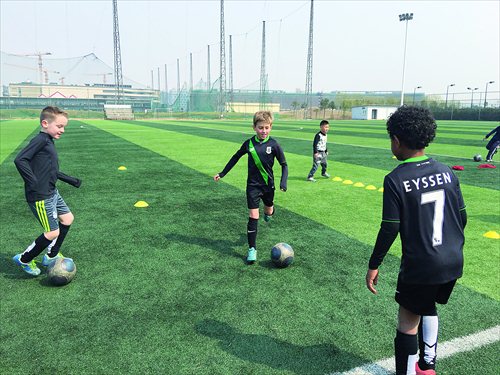Former Danish football star gives the lowdown on soccer in China
Scoring foreign goals
The Chinese Football Association recently published on its website a development plan for Chinese football.
According to the plan the mid-term target will be that the 2030 Chinese national men's team will be the leading team in Asia and the national women's team will be the best in the world.
The long-term target is that by 2050 China will be an influential and powerful football nation and Chinese football will be properly developed.
The world is looking closely to see how football in China develops.
It has had, to date, a mixed outcome with legions of keen fans, some international disasters and many of football's biggest names coming here to play or coach.
Ebbe Sand (pictured below), the former Danish professional footballer is one helping renovate football in China.

He played as a striker for Brøndby IF in Denmark and for FC Schalke 04 in Germany. He was the German Bundesliga's top scorer in 2001, and he won the DFB-Pokal in 2001 and 2002 with Schalke.
On the international stage, he was in the national Danish team at the 1998 and 2002 FIFA World Cups, as well as the 2000 and 2004 European Championships.
In 2012 Sand launched the Ebbe Sand Soccer Academy to explore, attract and motivate children to play soccer in Shanghai.
Currently they have around 300 children learning - some 40 of these upcoming talents are Chinese.
The Global Times talked with Ebbe Sand before one of his training sessions.

Ebbe Sand has launched a soccer academy to explore, attract and motivate children to play soccer in Shanghai. Photos: Qi Xijia/GT
GT: What is your mission?
ES: The mission is to explore, attract and motivate the kids to play soccer. Because the government has enhanced the focus on Chinese football, that's good for us. We have the experience already and we are doing our best to be a part of this. So this is not only to find the next professional players but of course that will be a pleasure. When we talk about Chinese football we can for sure develop the next big star in China so that's also one of our aims - to help and develop the next professional players and stars for China and even for Europe because I have fantastic network in Europe. We have a player I have sent to my former club in Denmark. He played in the club for a week so that has been a great experience for him.
GT: Why do you think Chinese footballers don't make it to play in Europe?
ES: The problem is the structure. Because here, you don't start early enough. In Denmark and Europe we start when we are 5 years old. That's why I wanted to focus on Chinese kids to start a program for little kids, 5 or 6 years old. There is no shortcut - like you can't start with a player when he is 15 and develop his skill over three years. If you want to create big stars you have to start early. You have to start with 5- or 6-year-old and you have never done this in China or not enough. We have only 5.5 million people in Denmark but we qualified for the European Championships and the World Cup many times because we are really good at developing players. We want to offer exactly the same in Shanghai.
GT: Does having been a player help you understand the players better?
ES: Yes, that's a big advantage. I have 30 years experience in football. It's not easy to be a football coach. It's a team sport. It's about the understanding between 11 players. To score a goal it's like three people have to have the same idea at the same time and run the right way. This is a difficult part of team sport.
GT: The Chinese government has enhanced football education. Many local schools now have football classes with foreign coaches. Do you think this is a step forward?
ES: For sure this is a big step forward because now you start to focus on early education. This is great. This is the first step. If I was a government I would create more facilities. I used to live in a small city in Denmark with only 5,000 people living there but we had five full pitches. There are 1.3 billion people in China. A lot of them are born with a great talent for football but if you don't develop this talent and don't start early and offer them good facilities you will never see the result. You have taken the first step but you have to be patient. It is a long-term project.
GT: Many stars have joined football clubs in Shanghai. Do you think this will benefit Chinese football in the long run?
ES: It's not only about the stars. It's also about the age of the star. Earlier it was like they were coming because they were approaching the end of their careers but now you have stars that are not at the end of their careers. They are at the best age for footballers. It's good for Chinese football because when you have good foreign players you can develop the local players' skills as well. It is the first step that you have stars like this but, for the future players you have to focus on the grass roots of the next generation.